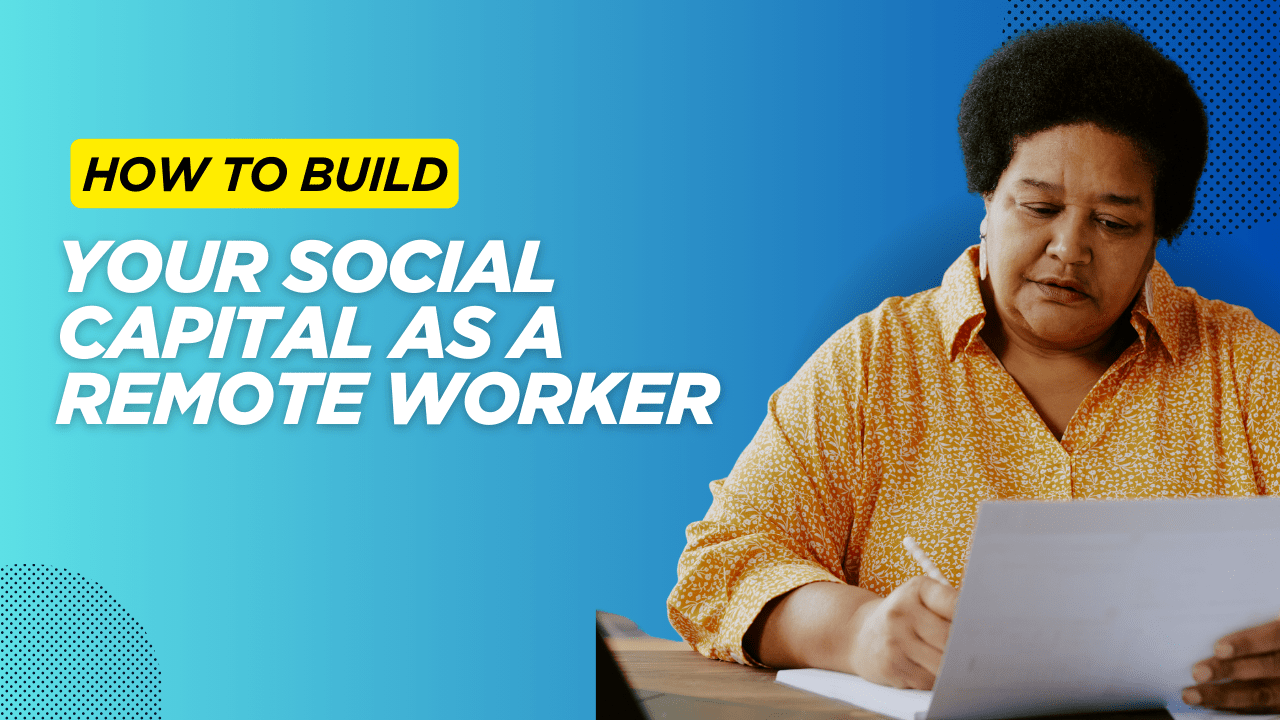Remote work doesn’t erase human connection; it challenges us to be more intentional about it.
Ever notice how, in a regular office, you can bump into someone at the coffee machine and suddenly you’ve got an ally in finance or a mentor in marketing? Remote work doesn’t give you that luxury. No coffee machine. No Friday happy hours. No casual “walk and talk” with your manager.
And yet, your career still depends on people knowing, liking, and trusting you. That’s what social capital is.
The invisible currency that determines who gets opportunities, who gets information first, and who gets recommended for the big roles.
So the real question is: how do you build it when you work behind a laptop in your living room?
What Social Capital Really Mean?
Forget the fancy textbook definitions. Social capital isn’t a buzzword you throw around in MBA classes, it’s actually much simpler than that.
At its core, social capital means three things:
- People think of you when opportunities come up. Imagine your company is starting a new project that needs someone organized, creative, and dependable. Who gets recommended? The person whose name comes to mind first. That’s social capital. You’ve built enough presence and trust that you’re top of mind, even when you’re not in the room.
- People trust you enough to work with you, recommend you, or back your ideas. Trust is currency. Colleagues won’t stake their reputation on you unless they’ve seen you deliver, communicate clearly, and handle challenges without drama. When you’ve built social capital, others feel safe saying: “Yeah, she’s the right person for this—count her in.”
- People feel like you make their lives easier, not harder. Nobody wants to collaborate with someone who adds stress. Social capital grows when people know you will reply on time, explain things clearly, share resources, and recognize their efforts.
In an office, social capital grows almost by accident. You chat in hallways, share snacks in the break room, or help someone carry boxes from the printer. But in remote work, those natural moments don’t happen. If you don’t communicate clearly, people assume you’re checked out. If you don’t show up intentionally, you risk being invisible. Finally, If you don’t build goodwill, you’re just another name on an email thread.
Remote social capital isn’t automatic; you have to design it. But once you learn how to build it, you’ll realize your career isn’t limited by geography anymore. You can earn trust, influence, and opportunity across time zones, companies, and even industries.
Ways to Build Social Capital as a Remote Worker
You already know what social capital is, but knowing isn’t the same as building it. And if you’re working remotely, building social capital requires creativity. You have to be intentional about how you show up, how you interact, and how you leave people feeling after every encounter. And if you’re wondering where to start, InclusivelyRemote regularly shares strategies, opportunities, and insights to help remote workers not only land jobs but also thrive in building meaningful workplace relationships.Social capital isn’t about being the loudest person in the virtual room. It’s about being the person people remember as reliable, generous, curious, and human.
When you make yourself visible, build trust consistently, give more than you take, tell stories, stay curious, play the long game, sprinkle humor, and find common ground—you become more than just another remote worker. You become the colleague people trust, recommend, and want on their team.
Because in the end, social capital isn’t built on transactions. It’s built on the simple truth: people don’t remember every task you complete, but they always remember how you made them feel.
And if you want to keep learning ways to stand out as a remote worker while building lasting professional capital, InclusivelyRemote is built for you—it’s not just about finding remote jobs, but about helping you grow careers, networks, and opportunities that thrive anywhere in the world.
So, here are some of the smartest, most practical ways to build social capital as a remote worker:
1. Make Yourself Visible (Without Being Annoying)
One of the biggest risks of remote work is invisibility. You could be doing brilliant work every single day, but if no one sees it, your career stalls. Visibility doesn’t mean bragging; it means making sure your value is noticed. Instead of sending one-word updates like “Done” in Slack, add context: “Report done, added a visual summary so it’s easier to share with clients.” This tiny tweak reminds people not just that you finished a task, but that you improved it. Similarly, don’t be a ghost in meetings. You don’t need to dominate conversations, but at least ask a clarifying question or summarize a key point. Those little interventions signal presence. And yes, once in a while, turn your camera on. Human faces stick in memory far longer than initials in a black square.
2. Build Trust in Tiny, Consistent Ways
Trust is the invisible glue that holds relationships together. In remote work, it’s not built with dramatic gestures; it’s built with consistency. When you promise a Friday deadline, deliver on Friday. When a roadblock comes up, don’t wait until the last minute to explain, flag it early: “I may need an extra day, looping you in so we can adjust if needed.” That one sentence preserves confidence. Also, don’t let your thinking be invisible. In offices, people can see you sketch ideas on a whiteboard or working late. Remotely, they can’t. So narrate your process: “I recommended this option because it balances cost and timeline.” It shows rigor and makes others trust your judgment.
3. Give More Than You Take
Think about the people you enjoy working with most. Chances are, they make your life easier. That’s the core of giving—being a multiplier, not a drain. Remote workers can “give” in small but powerful ways. Share a resource that solved your problem so others don’t waste hours. Record a quick screen-share showing a trick in Excel or Notion or amplify colleagues publicly: “This idea came from Priya, she deserves the credit.” When you give without keeping score, you become memorable. People naturally want to work with and help those who helped them first. That generosity is the fastest way to grow social capital.
4. Learn the Art of Storytelling
In remote work, you don’t get the advantage of tone, body language, or physical presence to persuade people. That’s why storytelling is your secret weapon. Don’t just drop numbers: “We cut processing time by 20%.” Tell the story: “Three months ago, customers were waiting three extra days. After we redesigned the process, time dropped by 20% and now customers get responses faster.” The difference? Numbers impress, but stories stick, and memorability is what turns competence into influence.
5. When in Doubt, Be Curious
Curiosity might be the most underrated social skill. It makes people feel valued, and it keeps you from being the colleague who only talks about themselves. Instead of small talk that dies in seconds, try open-ended questions:
- “How did you get into your role?”
- “What’s the coolest project you’ve worked on here?”
- “If you could wave a magic wand and fix one thing about remote work, what would it be?”
People love talking about themselves. And when you listen actively, you learn things that deepen relationships far more than weather talk ever could.
6. Play the Long Game
The truth is, you won’t see instant returns on social capital. It’s not a vending machine; it’s compound interest. Stay in touch with people months after projects end: “Saw this article and it reminded me of our work on X—how have you been?” Offer to mentor juniors, while also seeking guidance from seniors. And don’t just build relationships within your team, expand across departments, industries, and even LinkedIn connections. Sociologists call this the power of weak ties: the people you don’t talk to every day are often the ones who open the biggest doors.
7. Use Humor to Bridge the Digital Gap
Remote meetings can feel stiff, formal, and draining. Humor is the easiest way to break the ice and make yourself approachable.
Try lines like:
- “Sorry if I look distracted, my cat is holding me hostage for snacks.”
- “If my WiFi cuts out, I promise it’s my router, not me trying to dodge this meeting.”
You don’t have to be a comedian. A little lightness signals that you’re human, not a robot. And approachable humans attract trust, loyalty, and collaboration.
8. Find Shared Ground Outside Work
The strongest bonds aren’t just built on tasks; they’re built on humanity. Don’t limit conversations to deadlines and deliverables.
Ask about hobbies: “You mentioned you like running—training for anything right now?” Or share cultural swaps: “I’m always hunting for new books or music recs. Do you have any favorites?” These questions seem small, but they invite stories. And stories are where real relationships grow.
Social capital isn’t about being the loudest person in the virtual room. It’s about being the person people remember as reliable, generous, curious, and human. When you make yourself visible, build trust consistently, give more than you take, tell stories, stay curious, play the long game, sprinkle humor, and find common ground, you become more than just another remote worker. You become the colleague people trust, recommend, and want on their team.
Because in the end, social capital isn’t built on transactions. It’s built on the fact that people don’t remember every task you complete, but they always remember how you made them feel. If you want to keep learning ways to stand out as a remote worker while building lasting professional capital, InclusivelyRemote is built for you, it’s not just about finding remote jobs, but about helping you grow careers, networks, and opportunities that thrive anywhere in the world.




